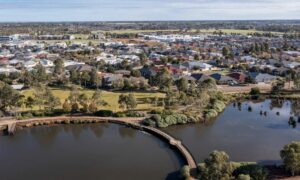Presented by Co-Opera: Opera on the move
Reviewed Thursday 26th April 2012
Acis and Galatea was the major work of the evening, but it was preceded by American composer, Jeremy Beck’s, 1994 composition for soprano and piano, Black Water. Based on the book of the same name by Joyce Carol Oates, it refers to the death of Mary Jo Kopechne, who is renamed Kelly in the book. Kopechne drowned when Senator Edward Kennedy drove off a bridge into the water on Chappaquiddick in Massachusetts in 1969. It is seen from the point of view of the dying Kelly, who takes hours to suffocate as a bubble of air trapped in the submerged car slowly runs out. In a series of short segments we hear her thoughts as she sits trapped in the car slowly dying, her hopes for rescue, and flashbacks to moments during the events leading up to the accident. Beck wrote both the words and music for this very moving piece.
The work was performed by pianist Julie Sargeant and soprano, Karen Fitz-Gibbon, reprising the performance that they presented, under the Co-Opera banner, during the recent Adelaide Fringe. This is a very powerful and moving work and Fitz-Gibbon invests it with all of the emotional range needed, from the fun of the party, the fear at the fast driving, the shock of the accident, and the hope for an imminent rescue. Fitz-Gibbon displays a phenomenal control of her voice and exceptional acting skills, with a most empathetic accompaniment from Sargeant.
The melody line has occasional hints of Stephen Sondheim and the piano part occasionally references George Gershwin’s symphonic works in the jazz based motif, when Kelly sings about the times at the party. There are also sounds of a clock ticking in the piano part when we join her in the submerged car, indicating the extreme urgency of the situation, and the rising adrenalin in the speeding and out of control car, too, gets a boost from the accompaniment. This was a very fine start to the evening.
After the interval there was a complete contrast as we moved from the late 20th century to the early 18th and George Frideric Handel’s English pastoral work, Acis and Galatea, based on the story from Greek mythology with a libretto by John Gay and Alexander Pope. Filled with the most beautiful music, it is considered by many to be the epitome of pastoral opera. It was, incidentally, Handel’s first dramatic work in the English language.
Tenor, Robert Macfarlane, is right in his element, and perfectly cast in the role of the shepherd, Acis, a role that he makes his own in a superb performance. Soprano, Sara Lambert, as the nymph Galatea, is another fine casting choice, bringing a warmth and sensitivity to the role.
Bass, Jeremy Tatchell, plays the giant Cyclops, Polypheme (or Polyphemus), who is intensely jealous of Acis for having the love of Galatea.Tatchell’s powerful voice is ideally suited to the role and his fine characterisation completes his transformation. Visiting tenor, Tan Wei Han, plays Damon, another shepherd and close friend of Acis who warns the lovers that love is fleeting. His availability for this production is an added bonus to an already magnificent production
Karen Fitz-Gibbon is Coridon, yet another shepherd, who tries to calm Polypheme, but without success. She brings a gentleness to the role that suits the role exactly. Polypheme eventually kills Acis in a rage, but Acis is turned into a “murm’ring brook”, representing a form of immortality. Dancers, Carlie Angel and José Gonzales, reflect and comment on the action, somehow appearing both innocent and sensuous at the same time, with a freedom of expression reminiscent of the style of Isadora Duncan.
Director, Tessa Bremner, has created a vibrant production. with plenty of movement and a number of tableaux. Musical Director, Brian Chatterton, has a marvellous group of musicians playing for him and has brought the best out of soloists and chorus. There is a clear enthusiasm for this work from everybody. Designer, Kathryn Sproul, employs an elegant simplicity, with a two tiered stage, and images projected onto a screen behind the singers, depicting both rural scenes and stately gardens, with lighting by Susan Grey-Gardner changing subtly throughout. The chorus of eight supply some wonderful harmonies as well as adding some effective movement to the work.
This is definitely a must for lovers of great opera, and of Baroque music in particular and, surprisingly, it is seldom performed, so take advantage of this unique opportunity.
Reviewed by Barry Lenny, Arts Editor, Glam Adelaide.
Venue: Thomas Edmonds Opera Studio, Adelaide Showground, Wayville, enter off Rose Terrace
Season: 7:30pm Fri 27th to Sun 29th April, 2012. Note: Co-Opera performances are presented in cabaret format. Doors open 6:30pm. BYO food and drink. [Sun 29th is SOLD OUT]
Duration: 3 hours including long supper interval
Tickets: Adults $49/concession and Friends of Co-Opera $43
Bookings: the Friends of Co-Opera 08 8223 6261 or email [email protected] or here http://www.dramatix.com.au/event/show/826




















